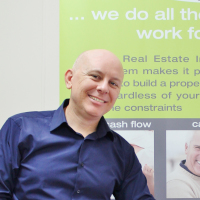Pros and cons of off-the-plan investments
With certain markets experiencing significant residential development, it is important to weigh up the hidden risks and potential advantages of purchasing off-the-plan.

Blogger: Paul Wilson, founder, We Find Houses Group
The South-East Queensland property market is booming, and it’s no secret.
Investors are flocking to the sunshine state and snapping up properties in the hotspots of the Gold Coast, Ipswich and Brisbane.
But amid all the hype and excitement, it’s vital to think about what you’re investing in, not just how and where.
I want to talk about the type of property to purchase and the reasons for and against, particularly off-the-plan apartment stock.
Yes, all signs point straight ahead for South-East Queensland – with the Commonwealth Games, boosted tourism and a wide range of infrastructure in the pipeline – but if inner-city Brisbane is your pick, be wary.
There is growing concern that the 20,000-plus apartments either under construction or currently being marketed will lead to oversupply.
Yes, the Brisbane market has been flourishing, but getting caught up in buying an apartment off-the-plan – a property that is still 18 months to two years away from completion – could be a very bad idea.
Why?
Let’s back-track a little first.
Buying close to the CBD is generally attractive due to work, transport and amenity benefits. However, the balance between supply and demand must always be considered.
In Brisbane, for example, there are genuine concerns that the growing number of high-rise developments could lead to an oversupply – where there are too many apartments for the number of people buying.
Oversupply results in prices going down. And things can take a particularly scary turn when it comes to people buying off-the-plan.
If a property is sold off-the-plan, your conditions can’t be subject to finance because the bank valuation is done on completion. This means you’ll have to go unconditional on your loan.
So what happens when the property is completed 18 months to two years later and demand is no longer high?
The units won’t value up because the banks will take a conservative approach, and if the valuation doesn’t line up, you’ll have to kick in the extra equity.
This is not a good position to be in. It leaves you financially vulnerable and exposed to a great deal of risk.
And who knows how much extra you’ll have to commit if prices plummet?
Market conditions
There are many considerations that come into play with high-rise developments.
The market has to absorb all the new properties. So, the market has to wait for that stock to be consumed for supply and demand to stay in balance.
Flooding the market with stock will only bring down the value. And if properties in a certain area are all sold to investors, then there’s no demand – there are no people that want to actually live in the area as owner-occupiers.
The better option
Buying an apartment in a high-rise building always presents more risk than purchasing a freestanding house. This is because apartments generally don’t produce the same level of capital growth that a freestanding house will.
But if a freestanding house is not within your reach, a boutique townhouse development is a much better option.
A smaller townhouse development will appeal to both investors and owner-occupiers. And it’s more likely the property will be better valued if it’s already established, rather than off-the-plan.
Regardless of the type of property you’re buying, though, you need to be confident that it will provide you with the returns you’re looking for.
You need to understand the product you’re buying and the value it will provide, and be confident in the area you choose.
